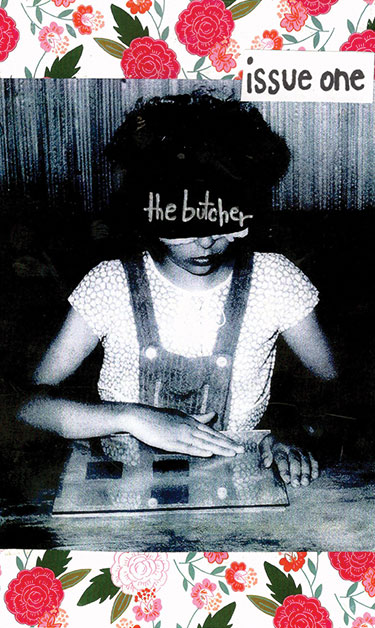
The Butcher
Zine, The Butcher (Rozali Telbis), 10 pgs, [email protected], $3
The inaugural issue of The Butcher, an eponymous, full-colour zine based out of Vancouver, is a hybrid of collage, poetry, and prose targeting the structures propping up a corrupt system of corporate capitalism. Its exterior and first several pages are of collaged image and text with a bit of an Adbusters feel, and include two cut up poems, “Side A” and “Side B.” Both poems make severe condemnations of the status quo, both have the flair of a fragmented political manifesto, and, as a reader gratified by the succinct, vitriolic exposure of social ills, I found these poems punchy and thought-provoking.
The zine’s second half contains an essay titled “False Dissent in a Sterile Society,” mounting a direct attack on a culture made up of “false rebels,” “spine-less liberals,” and “degraded heroes.” The Butcher writes in sweeping statements that, while built on an interesting and valid critical lens, make it almost impossible to get behind what the author is claiming as fact. The “false rebels” identified in the essay are said to suffer under the delusion that their actions subvert or undermine the structures of power when in fact, they serve only to feed them. An interesting idea, but as examples of “false rebels” in the contemporary context, The Butcher holds forth those who make fun of President Trump’s personal appearance, and demonstrators in the recent women’s marches. I find this dismissive, and it fails to acknowledge how these forms of rebellious discourse work to erode mainstream confidence in the establishment. The Butcher also gives us “spine-less liberals,” who have anesthetized their discourse in an attempt to render it “safe” enough for consumption by the masses, but also somehow “subversive” enough to garner attention. Again, interesting concept, but blaming identity politics, social media, and Hillary Clinton for our present mess does little to acknowledge the historical conditions leading to this precipice, conditions laid into the very bones of corporate capitalism.
There is much more to be said on the essay, but there were successes in the zine I would rather highlight. The Butcher excels in its use of collage, especially imagery, but also through referential texts. I am particularly fond of the second page — “Status Anxiety” written above a photograph of suit-jacketed businessmen on an escalator, surrounded by a Rolf Dieter Brinkmann quote, and backgrounded by a pink and mint green floral pattern — an image alone worth the $3 (including postage) that The Butcher costs. That said, the exterior and first few spreads demonstrate a keen eye for collage and design. From the alternating background motifs, to the selection of nostalgia-inducing photographs, I hope future issues foreground these aspects of the zine.
